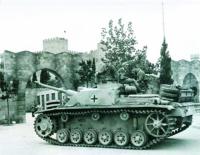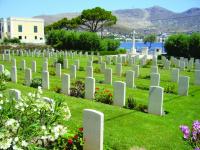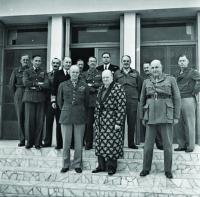Written By: Sam Ghaleb Ridgecrest, Calif.

German Panzer on Rhodes.

Commonwealth Cemetery at Leros.

Front row, l-r, Dwight D. Eisenhower, Winston S. Churchill, General Henry Maitland Wilson, Dec. 25, 1943 Morocco.
SEVENTY YEARS AGO, the British decided to occupy the Dodecanese Islands, in the Aegean Sea near Turkey. These islands were acquired by the Italian Kingdom from the Ottoman Turkish Empire in the war between the two in 1912. “Dodecanese” means “Twelve” in Greek. The "Twelve Islands" served as bases for the German invasion of Crete, in May 1941.
With Mussolini's government gone, after the Allied invasion of Italy in 1943, Winston Churchill decided to take control of these islands and use them as bomber bases to attack Adolf Hitler's oil fields in Romania. Churchill’s plans were opposed by General Dwight Eisenhower, based on his suspicion of British imperialistic ambitions. General Eisenhower was always in favor of a direct confrontation with German forces in Western Europe. For him a campaign to take these islands was nothing but a distraction that he could not afford. However, Churchill decided to proceed with his own plans to occupy the Dodecanese Islands, despite Eisenhower's decision that he could only spare some air cover for Churchill's forces. General Eisenhower believed that the number of troops the Allies could send on such an expedition would be insufficient since he could not be certain whether the Italian troops would assist the Allies or not. Even if such an invasion succeeded, General Eisenhower also did not believe the Allies had enough forces to form occupation garrisons.
In September 1943, the principal German force in the Dodecanese Islands was the 7,500-strong Assault Division "Rhodes" (Sturm-Division Rhodes) commanded by Lieutenant-General Ulrich Kleemann. This division had been formed during the summer on the island of Rhodes, which was the administrative center of the Dodecanese Islands, and possessed three military airfields. Because of this, Rhodes was the principal military objective for both the Allies and the Germans.
On 9 September, the German Sturm-Division Rhodes under General Kleemann attacked the 40,000-strong Italian garrison, and on 11 September, forced it to surrender. The loss of Rhodes dealt a heavy blow to Allied hopes.
During September of 1943, 4,000 British troops from the Middle East Command of General Sir Henry Maitland Wilson were landed and welcomed by eight of the twelve islands. Wilson then contacted the Italian governors of the islands of Kos, Leros and Samos, all of whom agreed to take British reinforcements which included paratroops, Special Boat Squadron units and squadrons of the RAF and South African Air Force. The German garrison occupying the island of Rhodes wanted to withdraw, but Hitler insisted the island should be held.
With the British too close for comfort, Hitler decided to strike back. On 23 September, Lieutenant-General Friedrich-Wilhelm Müller was ordered to take Kos and Leros. In October the Germans managed to assemble a battle group of two battalions, with artillery, engineers, and a parachute company from the Brandenburg Special Operations Unit. These forces were sent to take the island of Kos. Avoiding the Royal Navy’s patrols in the area, the infantry units came ashore in two groups on 3 October, at dawn, under cover of heavy air attacks. The parachute company then landed near the island’s airfield, and despite heavy losses, managed to capture it that day. The island’s defenders were composed of one British battalion and the Italian garrison. With typical German efficiency, the defenders were split up and by nightfall major resistance was over. The British managed to evacuate 105 troops, but 900 were taken prisoner by the Germans.
The Germans now were in a position to capture the island of Leros. Their effort was, however, delayed when the Royal Navy intercepted and sank a convoy carrying German troops. The Germans tried again on 12 November. Leros was held by a British brigade and 5,500 Italian troops who decided to fight with the Allies. These forces were short of transport, supplies, and every sort of artillery. To take the island the Germans assembled a force of four infantry battalions, and one parachute battalion. Once again the Royal Navy was kept at bay by fierce German air attacks, reminiscent of the invasion of the island of Crete, in May 1941. On that day the Germans made several landings. Some were repulsed, but beachheads were secured on the eastern coast of the island.
The British, suffering from poor communications because of the bombing, could not organize effective counterattacks. The next day more German reinforcements came ashore and their beachheads were expanded. By the 16th, the German forces linked up and were attacking the British Brigade Headquarters. With no hope of reinforcements, the island surrendered that day.
The island of Samos was next. It, too, surrendered to the Germans, on 20 November. Upon recapturing the islands, German troops carried out severe reprisals on the Italians who cooperated with British forces.
The ill conceived Dodecanese campaign had cost Churchill almost 5,000 men, 113 aircraft, six destroyers, two submarines and four heavily damaged cruisers. German losses were minimal - less than 1,200 men and 15 craft.
After the war, Eisenhower noted that, while he saw the strategic importance of the Dodecanese Islands, the importance of the campaign in Italy outweighed this deviation from the master plan. He claimed that the Combined Chiefs of Staff agreed with him on this view, but Churchill chose to ignore the advice against such an attack.
NEXT WEEK: VELLA LAVELLA
«Go back to the previous page.


